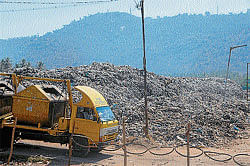
Solid waste management is one of the biggest challenges faced by urban local bodies thanks to rapid urbanisation. Much attention has been given in recent years for the safe disposal of waste generated in the cities. Solid wastes are those organic and inorganic materials that are generated and it's very important to dispose them scientifically as it may cause pollution to land, air and water.
According to an estimate, 400 tonnes of waste is generated daily in the city. It has become a herculean task for the MAC to dispose it. A treatment plant is set up at JP Nagar where 250 tonnes of bio-degradable waste is treated.
This unit is able to treat only wet waste such as rotten vegetables and fruits to convert into compost manure.
Daunting task
But the biggest challenge has been the disposal of recyclable waste (dry waste). Heaps of recyclable or dry wastes are found at the Excel treatment plant, in the absence of proper disposal unit.
Even the MAC is facing criticism from citizens and other environment-friendly organisations due to improper disposal of dry waste at the treatment plant.
At present the MAC has put pourakarmikas on the job of disposal of garbage and given a contract for the maintenance of SWM. The civic body is spending crores of rupees on this job to keep the city neat and clean.
In the midst of all these, the MAC has involved non-governmental organisations and implemented several new methods and technology to encourage the solid waste management.
Three years ago, the MAC roped in the services of Federation of Mysore City Corporation Ward Parliament in the disposal of solid waste management. Recently, the job of SWM was given to this resident welfare association in Ward Number 28 at Kumbarkoppal.
The zero waste management units have been set up by MAC with the help of the NGO.
Now that an NGO has shown how best the SWM could be managed in a scientific manner.
Representatives from various corporations, TMC, CMC and TPs have visited the ward to study the functioning of zero waste management. The vice-president of that NGO and Director of Tourism Development Institute Professor K S Nagapathy has been invited by many urban bodies to share knowledge on zero waste management.
The MAC has now found out solution through this unit to encourage zero waste management. Sheds have been constructed for the segregation of wastes and a separate unit for manufacturing compost at Kumbarkoppal unit.
This NGO has involved stree shakthi groups for door to door garbage collection and also to educate the residents on scientific disposal of waste.
Regularly, they collect both dry and wet waste from more than 5,000 houses in that ward and segregate the same into 28 items ranging from plastic covers to used plastic water bottles. This will be sold to various recycling units.
People from Bangalore, Pune and Tamil Nadu and other places are major buyers of this dry waste.
Today, the zero waste management units at Kumbarkoppal are earning thousands of rupees through manufacturing the compost manure and also from segregating waste.
There is a big demand for this manure from farmers and also from companies. The cost of this compost manure ` five per kilo.
The establishment of zero waste management units at Kumbarkoppal has saved lakhs of rupees which otherwise would have been spent on transportation and saved time and energy of pourakarmikas.
Before that the MAC was facing problems in shifting and disposal of waste from Hebbal to the Excel plant at J P Nagar.
MAC sources told City Herald that maintenance of zero waste management units is more feasible and cost effective when compared to awarding contract for the disposal of SWM to contractors.
Earlier, the MAC was paying ` 3.5 lakh to contractors per month for the disposal of solid waste.
But the total maintenance of zero waste management units including door -to -door garbage collection and production comes to around ` two lakh.
The sale of recyclable waste is fetching a handsome income for the MAC.
Extended
The MAC has already constructed sheds to set up the additional units in ward number 27 ( Hebbal and Lokanayaknagar), ward number 30 ( Brindavan, Gokulam and Manjunathapura), ward number 1 (Agrahara and Mysore Palace surroundings) and ward number 2 (Nalabeedhi and other surrounding places).
The sources said the MAC is interested in setting up such units in all wards but getting the land is a big problem.
The MCC is preparing to sell compost produced by zero waste management units under the brand name of 'Mysore Krishik Bangara' or 'Mysore Gold'. It has applied for license with the Department of Agriculture, as permission is required to sell the manure in open market. The sale of compost is expected to fetch lakhs of rupees revenue in the coming days.
President of Federation of Mysore City Corporation ward Parliament D Madegowda, who is instrumental in the success of zero waste management at Kumbarkoppal, said more than 75 urban local bodies of the state have evinced interest in setting up of zero waste management units.